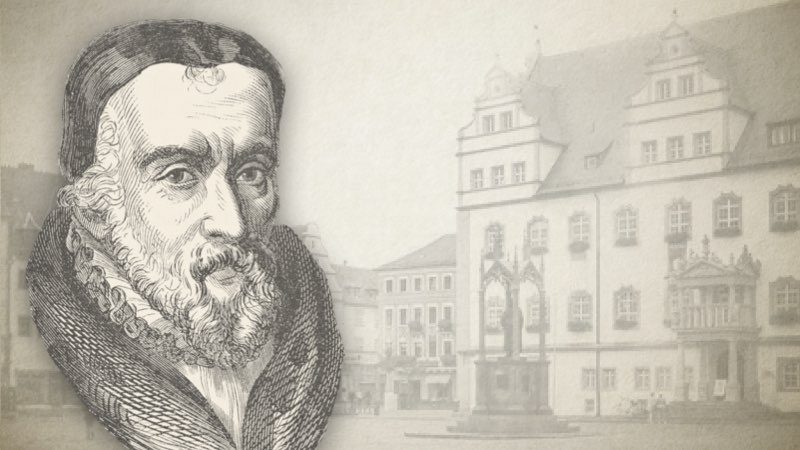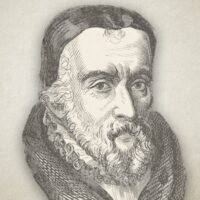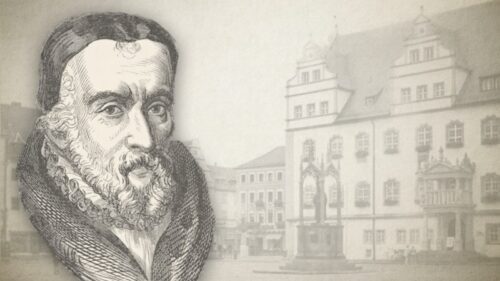
The Life And Testimony Of William Tyndale
The Sower 1886:
William Tyndale, a faithful minister and martyr of Christ, memorable for having made the first translation of the Bible that was printed in English, was born on the borders of Wales, some time before the year 1500. He was brought up from a child in the University of Oxford, where, as he advanced in years, he increased in the knowledge of the learned languages. He applied himself especially to the study of the Holy Scriptures, which he read with a meek and humble spirit, and with prayer for heavenly wisdom to direct him. Nor was he satisfied to hide under a bushel the light which he received from them; for, while he was living in Magdalen Hall, he read private lectures in divinity to some of the students and Fellows of Magdalen College, and instructed them in the knowledge and truth of the blessed Word of God. Being likewise a man of virtuous and godly living, he was greatly esteemed by those who knew him.
Having taken his degrees at Oxford, he removed to Cambridge, where he abode some time, during which he acquired more learning, and was further ripened in the knowledge of the Bible. From thence he went to reside with Sir J. Welch, a knight in Gloucestershire, as tutor to his children. This gentleman kept open house in a very hospitable manner, and frequently had at his table some of the beneficed and dignified clergy of his neighbourhood, with whom Tyndall often discoursed about the learned men of the day, as Luther and Erasmus, the controversies in religion, and the doctrines of the Holy Scriptures. In these conversations, Tyndall was accustomed to open his mind very freely, and, when they differed from him, he would point out the texts of Scripture which confirmed his assertions and confuted their errors.
At length the priests of the country began to take offence at his talking so much about the Bible, and called him a “heretic,” railing against him in the ale-houses and other places to which they resorted. They, moreover, accused him to the Chancellor of the Bishop’s court, who cited Tyndall to appear before him, and answer the charges which had been brought against him. When he appeared, the Chancellor threatened him grievously, bitterly reviling him, and laying many things to his charge which no accuser appeared to make good. After several examinations, Tyndall was set at liberty, and returned to the house of his patron.
Here he employed himself in translating a book written by Erasmus, entitled, “The Christian Soldier’s Manual,” which, when finished, he gave to Sir J. and Lady Welch, who carefully read it, and were so far convinced of the truth, in opposition to the Popish doctrines, that the abbots and priests, afterwards meeting with a cooler reception at their house than they had been accustomed to receive, soon declined their visits.
There lived in the neighbourhood an aged doctor (who had formerly been a Bishop’s Chancellor), to whom Mr. Tyndall often went to open his mind on the doctrines of the Holy Scriptures, being an old acquaintance of his. One day, this doctor said to him, “Do not you know that the Pope is the very Antichrist of whom the Scriptures speak? But beware what you say, for if you shall be perceived to be of that opinion, it will cost you your life.” He added, “I have been an officer of his; but I have given it up, and defy him and all his works.” This old clergyman seems to have been Tyndall’s only intimate friend, for he was so much molested by the other neighbouring priests that he was obliged to leave that part of the country.
One day, falling into the company of a learned divine, Tyndall refuted his arguments so forcibly from the Bible that the priest blasphemously exclaimed, “We had better be without God’s laws than the Pope’s.” Tyndall, filled with zeal for the honour of God, replied, “I defy the Pope and all his laws!” and added that, if God spared his life, ere many years, he would cause a boy that drove the plough to know more of the Scriptures than the priest did, which, blessed be God, has actually come to pass in our days, by the dispersion of the Holy Bible throughout our happy country. Poor people may now know more of the Word and will of God, than the priests did in those days of Popish darkness and ignorance. By means of the Society for Promoting Christian Knowledge, and the British and Foreign Bible Society, Bibles and Testaments may be bought at very low prices. How important must these institutions be, which have supplied the sacred volume in this way to numbers who otherwise would never have possessed it! How would the blessed martyrs and reformers have rejoiced, could they have witnessed the time when several millions of copies of the Holy Scriptures should, in the course of a few years, be dispersed by means of societies established in England!
Mr. Tyndall went to London, and there preached for some time as he had done in the country. But, being desirous to translate the New Testament into English, as the most effectual means, in his opinion, of removing the great darkness and ignorance or the people, he thought that he might obtain the patronage of Cuthbert Tonstal, Bishop of London, who had been extolled for his learning by Erasmus, and be admitted into his family for the purpose. He therefore wrote a Latin epistle to the Bishop, but he did not receive a favourable answer. He remained in London nearly a year, and at length, finding that he should not be able to make a translation of the New Testament with safety in England, or to get it printed in this realm, he went into Germany, where he had the assistance of John Frith, and published it about the year 1527.
At the end of this translation he addressed a letter to the learned, requesting them to amend anything which they found amiss, that the next edition might be more correct; and writing a letter to Frith respecting it, he says, “I call God to record, against the day we shall appear before our Lord Jesus, to give a reckoning of our doings, that I never altered one syllable of God’s Word against my conscience, nor would this day, if all that is in the earth, whether it be pleasure, honour, or riches, might be given me.” This being published, he began to translate likewise the Old Testament.
He wrote also several treatises, among which that called, “The Obedience of a Christian Man,” was the most remarkable, being frequently spoken of as the pocket companion (together with the New Testament) of many of the martyrs.
While he was in Germany, he went to see Luther and others of the learned Reformers in those quarters, after which, to be nearer his native land, he went into the Netherlands, and took up his abode at Antwerp. Having translated the five books of Moses, he determined to sail with them to Hamburg, and print them there; but he was shipwrecked on the coast of Holland, and lost all his books and writings, so that he was compelled to begin all again. Having sustained this great loss, he went in another ship to Hamburg, where, by his appointment, Miles Coverdale, afterwards Bishop of Exeter, was waiting for him, who assisted him in his second translation.
The Popish bishops were much enraged that any part of this blessed Book should be translated into the English language, saying that it was neither lawful nor expedient for the common people to have the Scriptures in their mother tongue; and they never rested until they had persuaded the king, Henry VIII, to issue a proclamation, forbidding the people to buy or read it, under pain of imprisonment and other punishments. This only served, however, to increase the people’s curiosity, leading them to read more carefully a Book which occasioned such alarm to the Popish clergy.
The Bishop of London thought the best way to prevent the Book getting into circulation would be, to buy up all the copies that could be met with, and burn them at Paul’s Cross. He, therefore, employed a person at Antwerp to procure them from Tyndall, who sold them to him, and immediately set about publishing a new and more correct edition. The Bishop was afterwards exceedingly mortified at having done this, for one Constantine, being apprehended by Sir Thomas Moore, and questioned how Tyndall and others subsisted abroad, replied that the Bishop of London had been their chief supporter, by buying up the first edition of the New Testament to burn it, and they lived upon this money until they received the amount of the sale of the second edition.
In this circumstance, we may admire the overruling providence of God, which makes the wrath of man to turn to His praise. The Bishop little thought that he was really furthering the cause which he endeavoured to destroy.
But, in order to put a stop to the business more effectually, a man of the name of Phillips was sent to Antwerp, to form an acquaintance with Tyndall, and, by pretending to have a very great regard for him, to bring about his ruin. Tyndall, being simple and inexperienced in the wily subtleness of this world, was easily caught in the trap laid for him.
Having returned to Antwerp some time before, this hypocrite was introduced into his company. A plan was laid for his being seized in the name of the emperor, and he was carried to the castle of Filford, about eighteen miles from Antwerp. Here he remained a prisoner more than a year and a half, during which time it pleased God to bless his conversation to the conversion of the gaoler, his daughter, and others of his household.
At length, after many disputations and examinations, notwithstanding the English merchants at Antwerp did what they could to procure his release, and letters in his favour were sent from England by Lord Cromwell and others, he was condemned by a decree of the emperor at Augsburg to die as a heretic. Being brought forth to the place of execution, while he was being fastened to the stake; he cried out with fervent zeal and a loud voice, “Lord, open the King of England’s eyes!” He was then strangled with a halter, and his corpse was burnt in the fire.
Thus he departed, in the year 1536, to that blessed abode “where the wicked cease from troubling, and the weary are at rest.” He left behind him the most valuable legacy which a pure patriot could ever make to his country—the Holy Bible in his mother tongue. It was afterwards revised and corrected by the excellent Archbishop Cranmer, and being published by the king’s authority, was, from the size of it, commonly called ”The Great Bible,” a part of which translation, namely, the Psalms, is continued in use in the Church of England to this day, that being the version which is contained in the Book of Common Prayer.
Through his great zeal and disinterestedness, Tyndall declared, before he went to Germany, that he should be content to live in any county in England on an allowance of ten pounds a year, and would bind himself to receive no more, if he might only have authority to instruct children and preach the Gospel; and in a letter to Frith he wrote, “I take God to record in my conscience that I desire of God for myself in this world no more than that without which I cannot keep His laws, namely, to owe no man anything.”
Thus, reader, you have a brief account of how the Bible was first translated and printed in the English language, and the treatment which this man of God met with for doing it, although his only desire was, to promote the eternal welfare of his fellow-countrymen. In the Bible, God has shown the way to heaven. The Lord Jesus Christ has said, “I am the Way, the Truth, and the Life: no man cometh unto the Father but by Me” (John 14:6). This plain truth the Popish priests ignored, and taught the people to pray to the Virgin Mary, and the apostles and saints in heaven, and even to wicked men, whom, although dying in their sins, they had called “saints,” instead of praying to the Lord Jesus Christ.
The people were also taught to worship images and crucifixes, in direct violation of the second commandment, instead of worshipping that God who is a Spirit, and who alone is everywhere present to hear and answer prayer, and who must be worshipped “in spirit and in truth.” Now that the Bible is known, by being in the English language, people may see for themselves that they are not imposed upon by such artifices as were practised in those days to enrich a profligate and corrupt priesthood, who did all they could to frighten the sick and dying out of their money, that they might put it into their own pockets.
You can now read the Bible, blessed be God, without danger, none daring to disturb you or make you afraid. The first Christians met together in the dark, “in dens and caves of the earth,” to sing hymns of praise to the Lord Jesus Christ, and were put to death if they were discovered. The first Protestants in England were imprisoned and put to death, if they were found worshipping God, or reading His Word, or even if they had it in their houses. But we live in happier times. “The lines have fallen to us in pleasant places,” in this respect. May we have grace given us rightly to use our great privileges, and never dishonour God by favouring men who pander to those who would gladly bring us again into bondage, had they the power and opportunity to deprive us of the liberty of conscience we now enjoy.
William Tyndale (1494-1536) was a sovereign grace preacher during the Protestant Reformation, a biblical scholar and linguist. He is best known for translating the Greek New Testament into English and overseeing its printing, publication and distribution. His work became the foundation for subsequent translations, such as the Coverdale Bible (1535), Matthew’s Bible (1537), Great Bible (1539), Bishop’s Bible (1568), Geneva Bible (1560) and the Authorized Version (1611). It is estimated the King James Translation retains 80% of Tyndale’s work.




